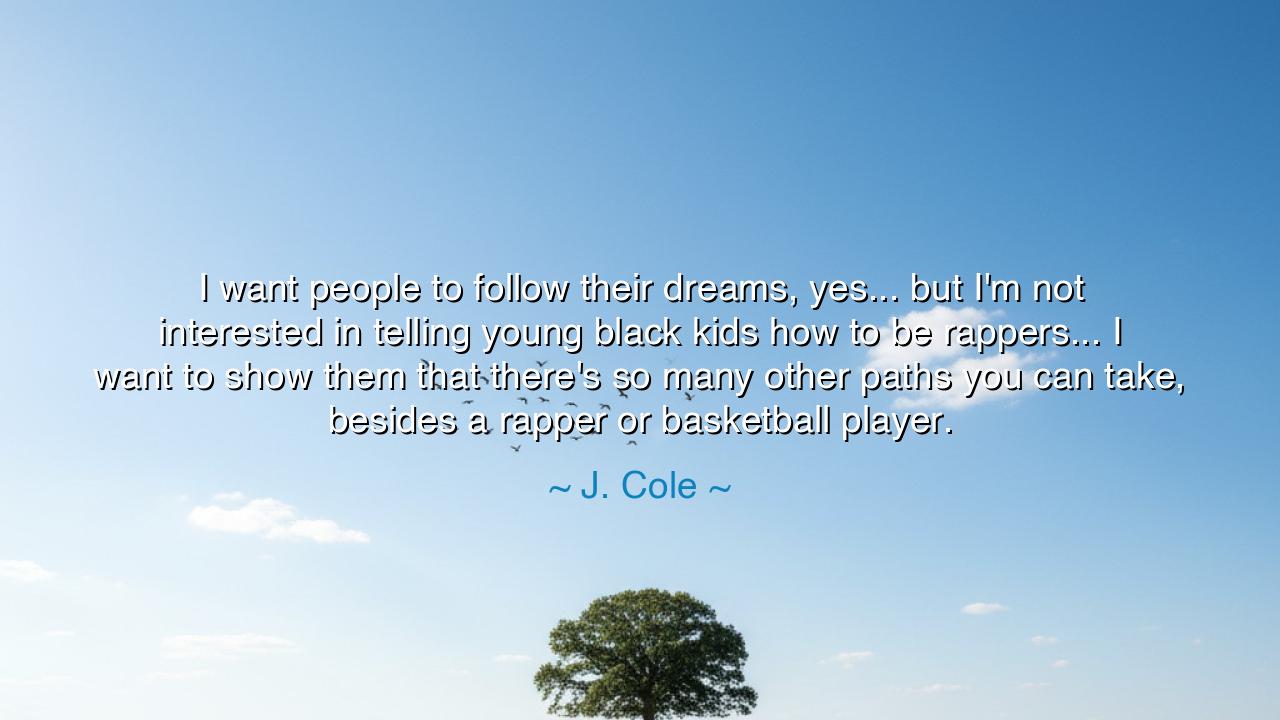
I want people to follow their dreams, yes... but I'm not
I want people to follow their dreams, yes... but I'm not interested in telling young black kids how to be rappers... I want to show them that there's so many other paths you can take, besides a rapper or basketball player.






In the powerful words of J. Cole, "I want people to follow their dreams, yes... but I'm not interested in telling young black kids how to be rappers... I want to show them that there's so many other paths you can take, besides a rapper or basketball player," we find a call to embrace the boundless potential that lies in each individual, especially among communities that have long been limited by societal expectations. J. Cole does not dismiss the value of following one's dreams, but rather emphasizes that the dreams we pursue should not be confined to the narrow vision of fame or sports. His words challenge the assumption that these paths are the only viable routes for success, especially for young black individuals, who often see these as their only options in a world that does not always present them with the same opportunities as others.
This sentiment echoes the wisdom of the ancients, who understood that life offers countless avenues to greatness, and that a person’s potential cannot be defined by a single pursuit. Aristotle spoke of the importance of cultivating a well-rounded life, not solely focused on one’s craft or trade, but with a pursuit of virtue and wisdom in multiple aspects of existence. For Aristotle, true greatness came not from excelling in one thing alone, but in nurturing a balanced and holistic life that embraced the full spectrum of human potential. J. Cole, in his modern context, asks young people to realize that their destinies are not limited to the societal labels that are often thrust upon them.
Consider the story of Frederick Douglass, a former slave who rose to prominence as a writer, orator, and abolitionist. Douglass’s life was defined not by the limitations imposed on him due to his race or his beginnings, but by his unwavering belief in his ability to shape his own future. He dreamed of freedom, but he also dreamed of knowledge, empowerment, and self-determination. Douglass’s journey demonstrates that while many might see one path to success—through physical strength or artistic talent—there are other paths to greatness that require intellectual rigor, resilience, and a relentless desire to learn and grow. He didn’t accept the limits others placed on him, and as a result, he opened new doors for others to follow. In the same way, J. Cole urges young people to dream big, but also to recognize the breadth of possibilities beyond the more traditional routes of athletics or entertainment.
J. Cole's challenge to young black kids is not just about shifting aspirations but about giving them the tools to recognize their value beyond a single identity. Throughout history, societies have sought to define people based on the most visible aspects of their being—be it their appearance, their social class, or their talents. Yet, the greatest achievers, like Maya Angelou, understood that identity is not limited to one role. Angelou, a poet, author, and activist, showed the world that greatness could come from words, from expression, and from a commitment to justice. Angelou’s life speaks to the multitude of ways one can shape the world, proving that a person’s worth is not confined to the roles society deems worthy, but is instead defined by the courage to dream and pursue one’s purpose.
The lesson in J. Cole’s message is not only about possibility, but about perspective. Just as the ancient philosophers believed in the importance of self-exploration and the pursuit of knowledge beyond the material world, J. Cole emphasizes that we must broaden our vision of what success looks like. To dream of being a rapper or basketball player is to dream of success, yes—but true success lies in recognizing that there are many roads to fulfillment. J. Cole urges the next generation to expand their understanding of what it means to live a meaningful life, to understand that each person has unique gifts and talents that might not necessarily fit the molds set by society.
We can see the profound implications of J. Cole’s words in the lives of those who have defied societal expectations. Barack Obama, for example, was able to rise to the office of President not because he fit a preconceived mold of what a leader should be, but because he understood the importance of vision, persistence, and education. Obama’s path was not one traditionally linked with black identity—he did not become famous through athletics or music—but through political involvement and a commitment to creating change. His story is a testament to the power of dreaming outside the confines of what others might expect, and to the power of education and service in shaping not just one’s future, but the future of an entire nation.
In embracing J. Cole’s message, we are reminded that the pursuit of greatness does not have to be a singular, narrow path. It is not enough to dream; we must also recognize that the world is full of untapped potential, and the paths to success are as varied as the individuals who walk them. Whether we are dreaming of becoming writers, doctors, engineers, or activists, we must understand that our dreams should reflect the fullness of who we are, and not just the roles society expects us to play.
In our own lives, we must ask ourselves: What are we dreaming for, and how can we expand those dreams? Like J. Cole, we must encourage others—especially the next generation—to pursue a life of purpose, a life of many possibilities, and to always keep their eyes open for the many paths that can lead to fulfillment and greatness.






AAdministratorAdministrator
Welcome, honored guests. Please leave a comment, we will respond soon